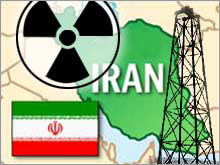Azerbaijan, Baku, May 17 / Trend S.Isayev, T. Jafarov/
The U.N. nuclear watchdog and Iran may be narrowing their differences on how to tackle concerns over Tehran's atomic ambitions, diplomatic sources said on Wednesday, suggesting a previously unexpected agreement was now not ruled out, Reuters reported.
They spoke a day after the U.N. agency said there was a "good exchange of views" with Iran in a May 14-15 meeting which tested the Islamic state's readiness to address questions about suspected nuclear weapons-relevant research.
Iran's envoy said the talks were "fruitful" and both sides said they had agreed to meet again next week, two days before Tehran resumes negotiations with world powers concerned it may be seeking to develop atomic bomb capability.
Any sign that Tehran may be willing to step up cooperation with the International Atomic Energy Agency (IAEA) in its long-stalled investigation into possible military dimensions to Iran's nuclear program would be seen as positive by the West.
But Western powers would be wary of any attempt by Iran to try to drag out discussions and buy time while it presses ahead with its disputed nuclear program.
"There seems to be a certain kind of progress," one Western diplomat said about this week's meeting between Iran and senior officials from the Vienna-based U.N. nuclear body.
He and other officials stressed that the picture remained unclear and the outcome of the next Vienna meeting on May 21 was uncertain. Hopes have been raised before, only to come to nothing.
They suggested Iran appeared keen for an agreement on a so-called "framework" or "structured approach" - a plan for how to deal with the IAEA's questions - ahead of the Baghdad talks on May 23, hoping to gain leverage in the negotiations.
Iran has made clear that only once such a deal is hammered out would it consider requests for inspector access to an Iranian military site, Parchin, where the IAEA suspects high-explosives tests may have taken place.
"It doesn't sound like they have made any progress on Parchin," one diplomat said.
The IAEA wants Iran to address issues raised by an agency report last year that revealed intelligence pointing to past and possibly ongoing activity in Iran of use in developing the means and technologies needed to build atom arms.
Iran says the allegations are fabricated, but the U.N. agency says its inspectors need access to sites, documents and officials as part of the investigation.
Two previous meetings between Iran and the IAEA in Tehran early this year failed to make any notable progress.
Separately on Wednesday, Western diplomats said representatives of Iran and the major powers had met to plan the agenda for the Baghdad meeting and that there would more contacts before next week's negotiations in the Iraqi capital.
Ali Bagheri, Iran's deputy negotiator, and Helga Schmid, a senior European Union official in charge of preparations, met last week at an undisclosed location, one diplomat said.
The EU leads negotiations on behalf of six major powers -- the United States, China, Russia, Britain, France and Germany -- with Iran over its nuclear program.
A second diplomat said of Schmid and Bagheri's meeting that it was about "logistics, process, refining the agenda", to make sure there was a substantive discussion in Baghdad.
Edited by: S. Isayev






